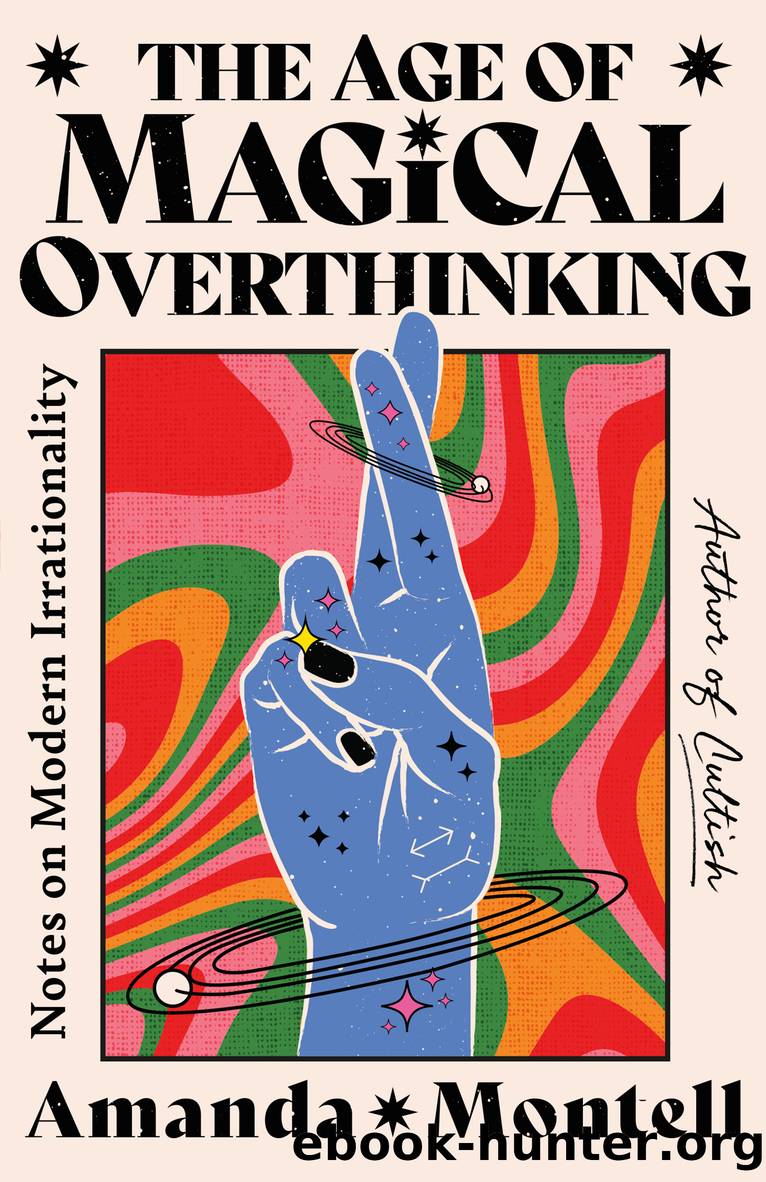The Age of Magical Overthinking by Amanda Montell

Author:Amanda Montell
Language: eng
Format: epub
Publisher: Atria/One Signal Publishers
Published: 2024-04-09T00:00:00+00:00
I. With cosmic irony, research on superiority complexes has found that people with depression assess their talents more objectively than others, a symptom termed âdepressive realism.â A 2013 paper published in the Proceedings of the National Academy of Sciences noted that people with weak connectivity between their brainâs frontal lobe (responsible for our sense of self) and striatum (part of the reward system) overall thought more highly of themselves than those with stronger connections between the two areas. Dopamine neurotransmitters located in the striatum inhibit connectivity to the frontal lobe, like rocks in a dam, so the more dopamine you have, the less connectivity between the two regions, and the more blissfully flattering your self-perception will be. Conversely, depleted dopamine = more depression = more realistic self-evaluation. But the former is whatâs described as ânormal.â Worshiping at our own altars without question is considered the âmentally healthyâ state.
II. A famous 1981 study by Swedish decision scientist Ola Svenson found that a whole 93 percent of respondents fancy themselves better behind the wheel than most.
III. Three years earlier, a survey by the Harris Poll and Lego determined that three times as many British, Chinese, and American children wanted to be YouTubers as astronauts.
IV. Not to mention, Holmes didnât go to jail for making overconfident promises to everyday people, but rather for making overconfident promises to wealthy investors, many of whomâincluding right-wing media magnate Rupert Murdoch and the Walton family of Walmart fameâhave, in my view (and no pun intended), more blood on their hands.
V. Speaking of ego, in early 2023 a friend asked if Iâd ever prompted ChatGPT to write something âin the style of Amanda Montell.â I hadnât, but after the seed was planted, my navel-gazing curiosity got the best of me. I asked the chatbot to write a paragraph defining cognitive biases in my voice. (âYouâre so weird. Itâs a Saturday. Get off the internet and go outside,â Casey told me the moment he learned Iâd done this.) Reader, the exercise was bizarre. The botâs closing line went, âYour mind is a playground, my love, and biases are the cheeky little bullies on the monkey bars.â I was simultaneously amused and offended. Do I really sound like that???
VI. awareness of oneâs own thought processes
Download
This site does not store any files on its server. We only index and link to content provided by other sites. Please contact the content providers to delete copyright contents if any and email us, we'll remove relevant links or contents immediately.
The Art of Thinking Clearly by Rolf Dobelli(8861)
Mindhunter: Inside the FBI's Elite Serial Crime Unit by John E. Douglas & Mark Olshaker(7847)
Change Your Questions, Change Your Life by Marilee Adams(6653)
Nudge - Improving Decisions about Health, Wealth, and Happiness by Thaler Sunstein(6641)
Mastermind: How to Think Like Sherlock Holmes by Maria Konnikova(6248)
The Power of Now: A Guide to Spiritual Enlightenment by Eckhart Tolle(4766)
Men In Love by Nancy Friday(4338)
Factfulness: Ten Reasons We're Wrong About the World – and Why Things Are Better Than You Think by Hans Rosling(4029)
The Confidence Code by Katty Kay(3575)
Thinking in Bets by Annie Duke(3539)
Man and His Symbols by Carl Gustav Jung(3325)
The Worm at the Core by Sheldon Solomon(2928)
Three Women by Lisa Taddeo(2924)
Why Buddhism is True by Robert Wright(2832)
Liar's Poker by Michael Lewis(2819)
The Inner Life of Animals by Peter Wohlleben(2776)
Descartes' Error by Antonio Damasio(2743)
The Power of Mindful Learning by Ellen J. Langer(2716)
The Slow Fix: Solve Problems, Work Smarter, and Live Better In a World Addicted to Speed by Carl Honore(2578)
